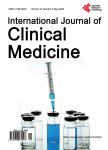Familial Hypercholesterolemia with Two Mutations in LDLR Gene: A Case Report and Literature Review
Familial Hypercholesterolemia with Two Mutations in LDLR Gene: A Case Report and Literature Review作者机构:Department of Endocrinology The Second Affiliated Hospital of Zhejiang University School of Medicine Hangzhou China Zhejiang University Hangzhou China
出 版 物:《International Journal of Clinical Medicine》 (临床医学国际期刊(英文))
年 卷 期:2017年第8卷第10期
页 面:556-564页
学科分类:1002[医学-临床医学] 100201[医学-内科学(含:心血管病、血液病、呼吸系病、消化系病、内分泌与代谢病、肾病、风湿病、传染病)] 10[医学]
主 题:Familial Hypercholesterolemia Inherited Disease Metabolism Low-Density Lipoprotein Receptor Gene Mutation
摘 要:We report a case of Familial hypercholesterolemia (FH) with two mutations in low density lipoprotein receptor (LDLR) gene and speculate the correlation between the newly discovered mutation type of LDLR gene and FH. We collected and analyzed the clinical data of the proband in the case and her immediate family members, and detected the LDLR, Proprotein Convertase Subtilisin/Kexin Type 9 (PCSK-9) and Apolipoprotein B (Apo B) gene in the peripheral blood of all the participants. We found that the curative effect of the patient is limited, but no obvious complication was detected. Genetic testing results pointed out that there were two mutations in the patient’s LDLR gene. One was p.W483* mutation in exon 10 (c. 1448 G A), another was p.T534I mutation in exon 11 (c. 1601 C T). The p. W483* mutation in exon 10 was detected in the father and sister, additionally p. T534I mutation in exon 11 was detected in the mother. Both the two LDLR gene mutations are inherited from her parents. We hypothesize that the patient in this case was a complex heterozygote. The newly discovered mutation gene (T534I) may be one of the important causes of dyslipidemia in patients, and its adverse effects are more serious than W483* which have been reported. Also, we predict that the T534I mutation will not cause serious early onset of cardiovascular complications.



